Gastric bypass surgery is a bariatric weight loss surgery performed for patients who are severely overweight, or who have been unsuccessful in losing weight through traditional methods such as exercise and diet. Also referred to as the Roux-en-Y gastric bypass surgery, it is usually performed on patients with a high body mass index (BMI over 40), and for those who have multiple obesity-related conditions. It is considered the gold standard of bariatric surgery and is the most common weight loss surgery performed in the United States.
During the Roux-en-Y gastric bypass procedure, the stomach is divided into a smaller top portion (pouch) that is about the size of an egg. The larger part of the stomach is then bypassed and is no longer able to store or digest food. The small intestine is divided and connected to the new stomach pouch to allow food to pass. As a result of the surgery, food completely bypasses the upper portion of the small intestine, which limits the absorption of calories and nutrients.
Patients who undergo this type of surgery must make a serious commitment to lifestyle change. After surgery, patients must pay careful attention to portion sizes and engage in daily physical activity.
The benefits of gastric bypass surgery include weight loss, improvement of obesity-related health conditions (diabetes, high blood pressure, high cholesterol, sleep apnea), improved quality of life, and longer life span.
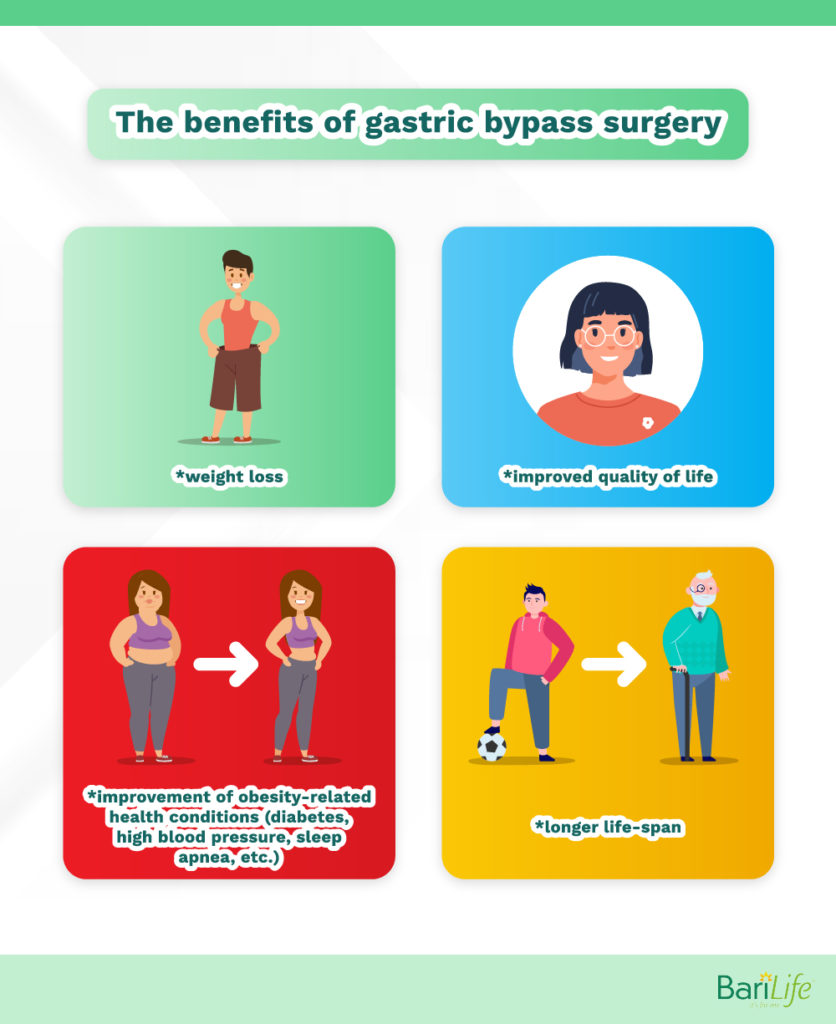
Things to avoid after gastric bypass surgery
Restrictions after gastric bypass surgery are mainly related to diet. The surgery is just the beginning of your weight loss journey, and you will need to commit to permanent lifestyle changes such as a balanced diet and regular physical activity. The benefits of adopting these lifestyle changes are significant.
Immediately following the operation (up to 4 months):
The post-surgery diet starts with liquid foods such as broth, unsweetened juice, decaffeinated tea or coffee, and sugar-free jello or popsicles. Your surgeon will tell you when your body has healed adequately, and you can start to add solid foods to your diet. Once your doctor gives you approval, you can transition to pureed foods, and eventually soft foods. Progressing from liquids to solids can take up to 3 months, but it may happen sooner. It all depends on how quickly your body adjusts to the changes made from the surgery.
Things you can’t eat or drink immediately after surgery:
- Carbonated beverages
- Caffeinated beverages
- Alcoholic beverages
- Beverages with added sugar
- Bread
- Raw vegetables
- Cooked fibrous vegetables, such as celery, broccoli, corn, or cabbage
- Tough meats or meats with gristle
- Red meat
- Fried foods
- Highly seasoned or spicy foods
- Nuts and seeds
- Popcorn
- Gum
Daily and physical activity
Your surgeon will decide when you are ready to be discharged based on your progress. When you return home after discharge, you should plan on taking it easy for a while, as your body is recovering from major surgery and weight loss during the recovery period. Wait at least 1-2 weeks before starting exercise, which will just be walking for 6-8 weeks.
Activities you should avoid immediately after surgery:
- Avoid lifting anything heavier than 20 to 30 pounds, or doing push or pull motions such as vacuuming, during the first six weeks after surgery
- Avoid heavy work such as lifting, carrying, or pushing heavy loads for the first three months after surgery
- Avoid sitting and standing without moving for long periods. Change positions frequently while sitting, and walk around in lieu of standing still. These strategies may help prevent blood clots from forming in your legs. Climbing stairs is encouraged
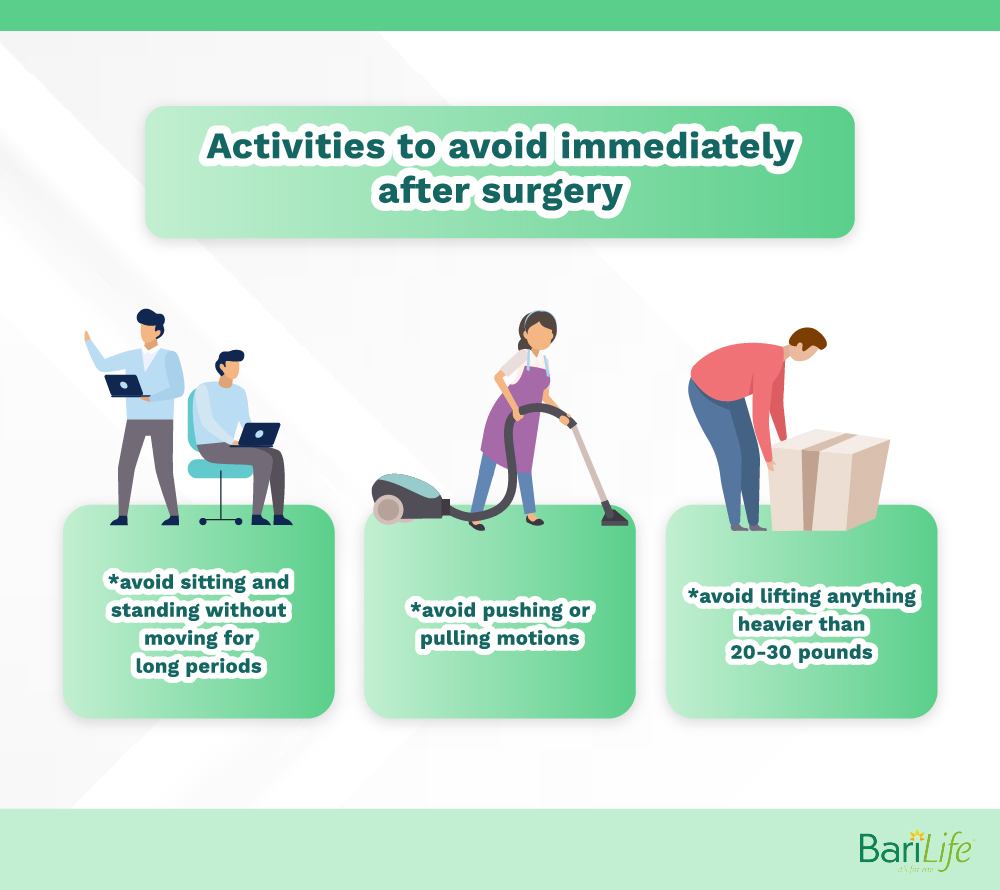
Medications to avoid
After surgery, any medications you take may need to be changed. Consult with your doctor about resuming any previously prescribed medications. Do not take non-steroidal anti-inflammatory drugs (NSAIDs) such as:
- Aspirin (and products containing aspirin such as Alka-seltzer)
- Ibuprofen
- Advil
- Motrin
- Aleve
- Naprosyn
- Vioxx
- Celebrex
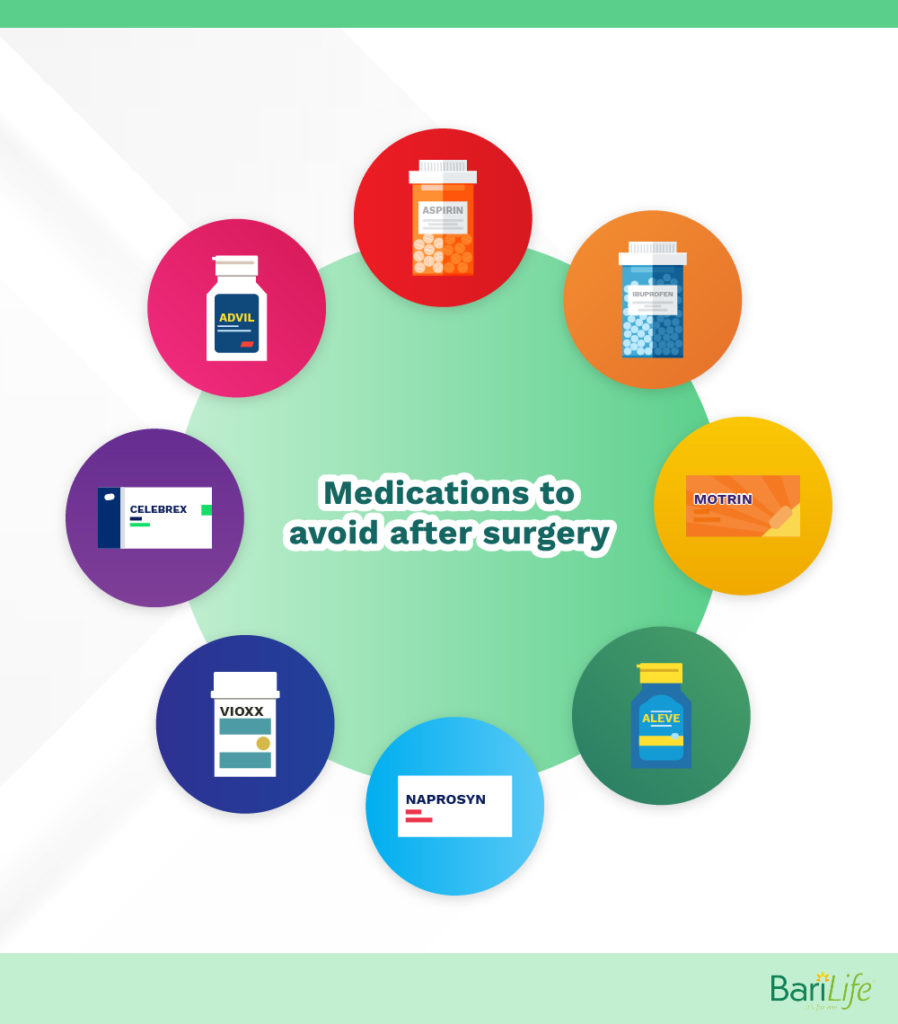
NSAIDs increase your risk of developing ulcers. After bariatric surgery, ulcers are more difficult to diagnose and treat. Check with your doctor before starting a new medication.
Nutrition goals and vitamins
Gastric bypass surgery alters the way your body absorbs nutrients. To prevent nutrient deficiencies, you must take supplemental vitamins daily after your surgery.
- Multivitamins – take a high-potency, chewable multivitamin, and mineral supplement, containing a minimum of 18 mg of iron, 400 mcg of folic acid. selenium, copper, and zinc, daily.
- Calcium – take 1200 to 2000 mg daily to prevent calcium deficiency and bone disease. To enhance absorption, take the calcium supplement in two to three divided doses throughout the day
- Vitamin D – take 3000 international units (IUs) of vitamin D daily. If you are already deficient in vitamin D, you may require even more.
- Vitamin B12 – take 500 mcg of vitamin B daily. This can be taken as a tablet or a tablet or liquid under the tongue. Remember, whole pills must be crushed. You may need additional folic acid or iron supplements, particularly if you are a female and still menstruating. Your dietitian will discuss this with you.
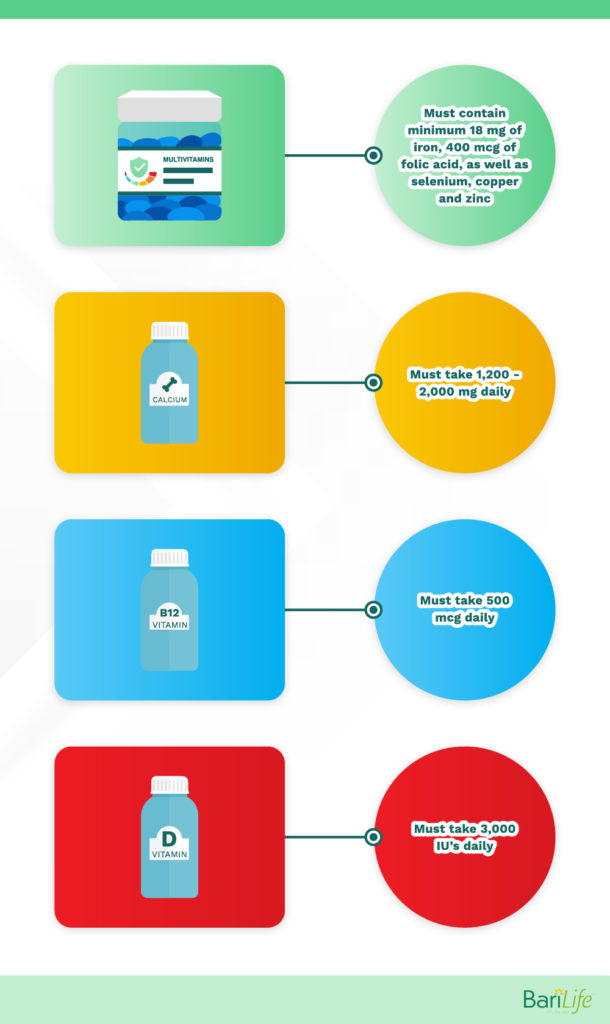
Long-term lifestyle changes (5 months post-op and beyond)
Around 4 to 5 months after your surgery, you can start eating a more liberalized diet. However, there are some foods you should continue to avoid because they may cause discomfort or increase your risk for complications.
Some foods are more likely to cause dumping syndrome, which occurs when food moves from your stomach to the small intestine too quickly. There are some foods you will need to avoid to prevent this from occurring.
Foods to avoid:
- Sugary beverages
- Carbonated beverages
- Alcoholic beverages
- Greasy, high-fat foods
- Foods that are high in sugar (cookies, cakes, pop tarts, donuts)
- Fried foods
- Spicy foods
- Red meat that is tough or dry
- Gum

Physical activity
About 4-6 months after your surgery, you can resume normal physical activities. This is a good time to incorporate strength training into your exercise routine. Always start with light weights and fewer repetitions and increase the weight and volume as your strength improves.
There are no activities you shouldn’t do, but just be aware that as you continue to lose weight and your body changes, balance and coordination may be affected. Use caution when performing an exercise, and seek guidance from an expert when needed.
Medications
As mentioned before, you cannot take NSAIDs after gastric bypass surgery, and you will need to avoid them for the rest of your life. Avoid medications such as:
- Aspirin (and products containing aspirin such as Alka-seltzer)
- Ibuprofen
- Advil
- Motrin
- Aleve
- Naprosyn
- Vioxx
- Celebrex
Check with your doctor before starting a new medication.
Nutrition goals and vitamin supplementation
Gastric bypass surgery decreases the absorption of vitamins and minerals from food. After weight loss surgery, patients will need to be on vitamin and mineral supplements for life. These typically include a multivitamin, Vitamin B12, Calcium, Vitamin D, and Iron.
After your surgery, it’s important to follow a healthy balanced diet to ensure adequate nutrition and keep your weight loss goals on track. You’ll want to eat and drink food slowly to avoid dumping syndrome. Keep your meals small, and drink liquids between meals. Take small bites and chew food thoroughly.
Make lean proteins the center of your meals, such as chicken breast, turkey, eggs, and lean beef. After protein, focus on non-starchy vegetables such as broccoli, cauliflower, and spinach, and then add fruit or starchy foods. Be cautious of starchy foods as they may cause gas and bloating.
Things you can do after bariatric surgery
There are many things you can do after bariatric surgery. Carrying extra weight and suffering from obesity-related health conditions often prevents people from living their best lives. About 90% of patients who receive bariatric surgery lose 50% of excess body weight and maintain weight loss long-term.
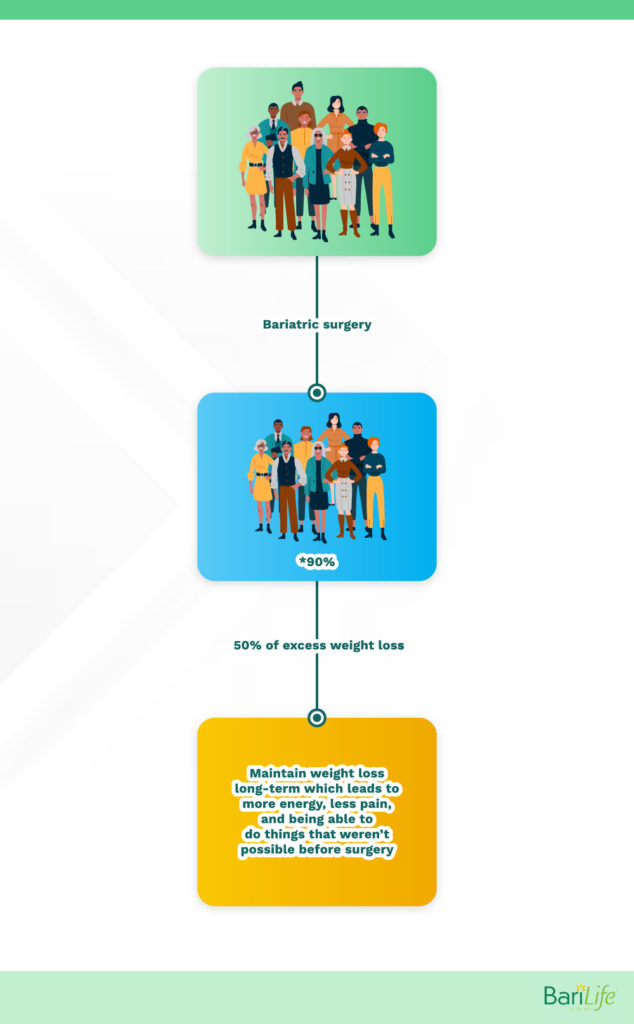
Patients have more energy, less pain, and are more interested in doing things they have not done in years. Bariatric surgery can open up a whole new world of physical and social activities that patients couldn’t do before.
Conclusion
Although there are restrictions and limitations following bariatric surgery, they are nothing in comparison to the enormous benefits and newfound freedom that comes with weight loss and improved health.
Adhering to the limitations is a small price to pay for better health, well-being, and better quality of life.




What are your tips and tricks to post-bariatric success?